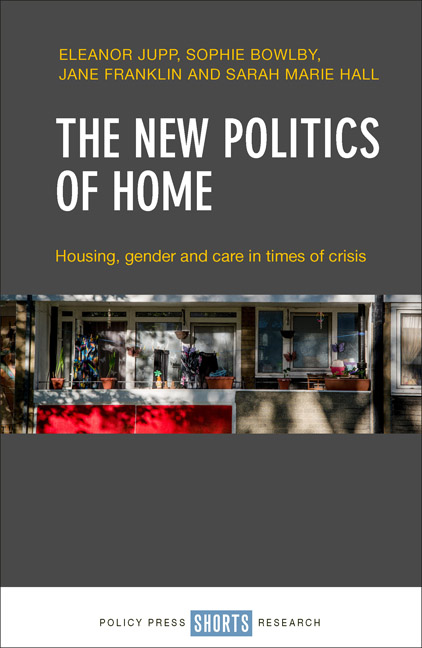Book contents
- Frontmatter
- Contents
- Notes on the authors
- Acknowledgements
- one Introduction: the new politics of home
- two Home economics: home and care in neoliberal policy
- three Caring in domestic spaces: inequalities and housing
- four Relational biographies in times of austerity: family, home and care
- five Spaces of care beyond the home: austerity and children’s services
- six Conclusion: opening up the politics of the home
- Notes
- References
- Index
three - Caring in domestic spaces: inequalities and housing
Published online by Cambridge University Press: 30 April 2022
- Frontmatter
- Contents
- Notes on the authors
- Acknowledgements
- one Introduction: the new politics of home
- two Home economics: home and care in neoliberal policy
- three Caring in domestic spaces: inequalities and housing
- four Relational biographies in times of austerity: family, home and care
- five Spaces of care beyond the home: austerity and children’s services
- six Conclusion: opening up the politics of the home
- Notes
- References
- Index
Summary
Introduction
Over the last few years there has been plenty of discussion in the British media of both ‘the housing crisis’ and ‘the crisis of social care’. However, possible interactions between these two ‘crises’ are rarely discussed. This chapter is about how housing, and the systems through which it is provided, affect the ability to give and receive care in domestic spaces. The focus is upon Britain and on the ‘care’, ‘assistance’ or ‘help’ provided to elderly, ill or disabled people of all ages in their domestic dwelling. However, these problems are not unique to the UK and reference will also be made other minority world countries.
The chapter draws on analyses of the material, symbolic and economic aspects of housing's intersections with care processes. The aim is to illustrate how housing matters to care, to argue that the role of housing in care is insufficiently recognised and to suggest fruitful ways in which this important topic might be examined further. The rest of the chapter is divided into the following sections: the next section introduces care and caring in domestic spaces and considers unequal access to care resources; the following and longest section illustrates the role of housing in care relationships in the light of previous discussions; and the final section concludes the chapter.
Inequalities of care and caring in domestic spaces
As the discussion of care in Chapter One has outlined, giving or receiving care within the ‘domestic space’ is part of most people's taken- for- granted everyday life. The care exchanged between people in a dwelling is affected by its immediate environment – the space, warmth and shelter it provides and the cultural meanings and practices associated with its characteristics. The physical environment of, and the services available in, a neighbourhood may also impinge upon caring practices linked to the home, for example, doing someone's shopping, going for a walk together or keeping an eye on a neighbour. People’s activities beyond the home – such as employment, education and leisure – will also affect their availability for exchanges of care within it. These in turn are affected by social and cultural expectations about care and by the policies and practices of government, employers and service providers. Figure 1 illustrates some of the relationships involved.
- Type
- Chapter
- Information
- The New Politics of HomeHousing, Gender and Care in Times of Crisis, pp. 39 - 62Publisher: Bristol University PressPrint publication year: 2019



